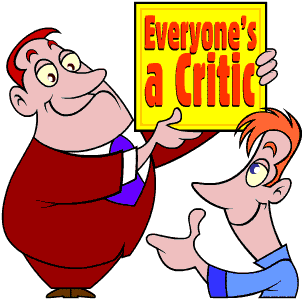Take Criticisms The Right Way
Everyone is going to have an opinion. But when it comes to criticism, how you react can make all the difference in the world.

Criticism is a tricky thing. It's not always easy to know how to take it, and sometimes it can be hard to understand why someone would say something negative about you or your work. Criticism is a part of life. It can be difficult to hear, but it's important to take it in stride.
We're all human, and we all have flaws that can be pointed out by others. When this happens, it can be hard not to take it personally or get defensive. But there are ways to take criticism with grace and gratitude.

First of all, try not to internalize other people's negative opinions of you. Instead, try to see their criticisms as helpful suggestions for improvement rather than outright attacks on your character or abilities. If you can do this, you'll be much more likely to learn from the experience and move on without feeling hurt or upset about it later on down the line. It's also important to remember that anyone who expresses an opinion is entitled to do so, whether you agree with them or not—and they're probably not trying to hurt you on purpose.
Then try asking yourself if there's any truth to what the person criticizing you is saying at all. If not, then don't worry about it! If so, then ask yourself why they would say this about you (or why these things are true). Is it because they think they have something to gain from it? Or is it because they really want to help you become better?
If someone tells you something is wrong with your work, it's usually because they want to help you make it better. This can be difficult when the critique seems personal or harsh, but remember that the person giving the critique is not attacking you—they are trying to help.
Remember that people who offer critiques aren't trying to hurt your feelings; they're just stating their opinion about something they feel strongly about. If someone says something mean or unhelpful, try not to take it personally. Remember that we all have our own opinions and experiences that shape how we look at things. That doesn't mean theirs is right and yours is wrong—it just means they see things differently than you do!

In Conclusion
When someone gives me a critique of my writing or art, I like to thank them for their feedback and then think about what they said for a few days before responding. It helps me think about what I wrote from their perspective instead of getting defensive or upset because of how it makes me feel.

I have learned over time that most people are just trying to help you improve and they're not trying to hurt you. At the same time, I don't want to dismiss the way something makes me feel because that's important too.
If it were easy to take criticism, then everyone would be good at everything! But sometimes criticism can be hard for people because it feels like an attack on who we are as individuals. Everyone has their own process for dealing with criticism and figuring out how best to respond to it. What works for one person might not work for another person in the same situation
I also know that not everyone will agree with me, so if someone says they don't like something, I just take it at face value. If they say they don't like something, but there's nothing in particular that stands out to them as objectionable, then I can only assume there's something about it that doesn't appeal to them personally—it might not be for everyone! We are all different and some people will always hate what others love, so don't take it personally.
And remember: if someone tells you something's wrong with your writing or art or whatever, that doesn't mean they don't like YOU! It just means they think something could be improved!
Copyright 2022 frdchckn. All rights reserved.



